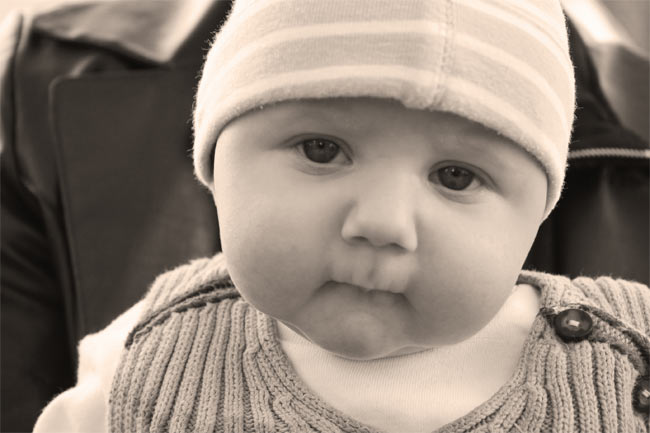Extra Weight in Babies Can Be A Perilous Subject

Like his older brother, Dominic Brittain was born big. In the first month of his life, baby Dominic gained four pounds – enough weight, his father said, to surprise the pediatrician.
"She was like, 'That's too much,'" Andrew Brittain, an artist in Brooklyn, told LiveScience.
Big babies who later slim down into slender kids are common in the family, so Brittain and his wife weren't too concerned about their chunky infant, who is now 2 months old. But on a national scale, doctors and researchers are getting worried about baby fat: not the normal kind that gives babies their dimpled knees and cherubic cheeks, but the extra weight that could follow a baby into childhood.
There's a growing awareness that obesity may start earlier than previously believed, said David McCormick, a pediatrician who has studied weight in kids under two at the University of Texas Medical Branch at Galveston.
But given the nutritional needs of growing babies, overweight babies are a sensitive subject, and for good reason. A chubby child doesn't always become an overweight adult. Further, how do you put a baby who's not even eating solid food on a diet? You don't, doctors say.
Babies getting bigger
First, some numbers: Research suggests that extra weight in infants is a common problem. According to standardized growth charts, about a third of 9-month-olds and a third of 2-year-olds are above the 85th percentile of their weight for their height, researchers reported this month in the American Journal of Health Promotion. Above this percentile is the point where doctors start to worry about kids' weight.
Get the world’s most fascinating discoveries delivered straight to your inbox.
"Historically about 15 percent of babies were above that weight [the 85th percentile], and now 30 percent are," said Alan Greene, a professor of pediatrics at the Stanford University School of Medicine and author of "Feeding Baby Green: The Earth-Friendly Program for Healthy, Safe Nutrition During Pregnancy, Childhood, and Beyond" (Jossey-Bass, 2009). Greene was not involved in the study.
McCormick found in one study that 16 percent of 6-month-olds seen at the UT Medical Branch in Galveston weighed in at the 95th percentile or more of weight for height. The results were published online in the Journal of Pediatrics in March.
"Usually you expect about 5 percent over the 95th percentile, the way the growth curves are designed," McCormick said. "So 16 percent is three times as many in that group as we should have had."
In both studies, babies who were heavier at an early age were more likely to be overweight at age 2 or 3. However, pediatricians warn, there is a lot of fluidity in baby weight. A hefty baby is not destined to become an overweight child.
"There is no reason whatsoever to look at chubby 6-month-old and say 'We're doomed," Deborah Lonzer, a pediatrician at the Cleveland Clinic in Ohio, told LiveScience.
You're letting him eat that?
Still, the idea of the food police turning their eye toward infants can be tough for parents. Beth Pulsifer-Anderson's son Chris, now 23, was a bruiser of a baby. The family learned that Chris could pull himself up on furniture the day the then-6-month-old got into a pizza left momentarily unattended on a coffee table.
"It was a supreme pizza with black olives, and the child had eaten every single solitary bit of topping off it," Pulsifer-Anderson, who lives in Maryland, told LiveScience.
Unbeknownst to Pulsifer-Anderson, her son had a rare disorder called gastroesophageal reflux, in which stomach contents flow back into the throat. One of baby Chris' symptoms was a sore throat, which he attempted to soothe with constant eating.
"People were horrified that we let him eat what he wanted to," said Pulsifer-Anderson. But in those days, people weren't talking about childhood obesity as much, she said. Many people thought a chubby baby who could scarf ribs was cute.
"I'm really glad I'm not living through it now, because I think people would be much more critical," she said.
Just say no to juice
Chris Anderson's height eventually caught up with his weight, and he slimmed down. By high school, he was a long-distance runner. Similarly, Andrew Brittain's son Dominic clocked in at a normal weight-for-length in the 75th percentile in his 2-month-old checkup.
For babies who stay heavy, it's usually easy to track down the cause, doctors say. Sugary drinks — including fruit juice — are way too common, said Lonzer. And vegetables have fallen by the wayside.
"The No. 1 vegetable for kids under 3 is French fries," Lonzer said. "I'm shocked. We've taken our bad adult diet and really drifted it down to kids, who should be learning the right way to eat and are not." [3 Simple Steps Can Cut Childhood Obesity]
Broaching the subject with parents, however, requires sensitivity. To many people, extra chub in infancy is a sign of health, said Deborah Blenner, an internal medicine pediatric physician at HealthBridge, a health care facility in Massachusetts. Affluent parents tend to fret about weight the most, Blenner said. Patients she once treated at a Brooklyn homeless shelter, on the other hand, saw big babies as strong and capable.
"Nobody wants to hear anything negative about their child, so you're not going to walk in the room at say, 'Your kid is really fat,'" said Alanna Kramer, a pediatrician at St. Christopher's Hospital for Children in Philadelphia. She tells parents, "It looks like they gained a little too much weight. Tell me what they're eating and what they're drinking."
Pediatricians never recommend diets for babies. Infants, especially if they're breastfeeding, are excellent at regulating their intake, doctors say. And, Blenner said, babies need diets that are half fat to support their developing brains. Usually, doctors recommend parents switch out low-nutrition foods for fiber-rich fruits and veggies. Parents may be chronic dieters themselves, Blenner said, and it's important to discourage them from becoming too restrictive with their children's food.
Starting healthy habits early
Despite increasing recognition of the problem, few studies have examined what really works to support healthy diets in kids under age 2. Most interventions focus on school-aged kids.
"What we don't know at this point is what we can do to actually make a difference," Russell Rothman, a professor of pediatrics at Vanderbilt University, told LiveScience.
That may soon change. Rothman is currently enrolling families for a study that will follow children from 2 months of age to 2 years of age. They plan to promote breastfeeding, reduce screen time (Kids as young as 6 months are exposed to two hours of television a day, Rothman said), and educate parents about the importance of limiting sugary drinks and pushing fruits and veggies. As they follow the families, they'll evaluate how well their program works.
Other researchers are looking at whether nipples on bottles can be redesigned to better approximate the experience of breastfeeding, which could help young babies better regulate their intake, Stanford's Greene said. Promoting health in adults is also likely to help babies, he said. Weight-related changes in how genes are expressed (known as epigenetic changes) may be passed on from parents to child, Greene said.
Meanwhile, the Institute of Medicine, the health arm of the National Academy of Sciences, has tasked a committee to review factors associated with obesity from birth to age 5. The committee is expected to make recommendations about appropriate prevention programs.
"I really think that there is a tremendous opportunity by starting at this very young age before unhealthy habits have gotten started," Rothman said. "I have kids of my own, and once they start getting exposed to sugary foods and certain things, they're very persistent."
That's where Andrew Brittain finds himself with his oldest son, Dante, now 2 1/2. Dante, a big baby, is now a normal-weight toddler – but he's got a "crazy sweet tooth," Brittain said. The challenge, Brittain said, is offsetting his son's desire for sweets while keeping food issues in perspective.
"I don't want to be one of these, like, maniacal Williamsburg parents that put their kids on a raw-food diet and have them eating clay and blue-green algae for lunch," Brittain said. "I just don't want him to be unhealthy."
- 8 Reasons Our Waistlines Are Expanding
- 7 Diets Tricks That Really Work
- 7 Solid Health Tips That no Longer Apply
You can follow LiveScience Senior Writer Stephanie Pappas on Twitter @sipappas.

Stephanie Pappas is a contributing writer for Live Science, covering topics ranging from geoscience to archaeology to the human brain and behavior. She was previously a senior writer for Live Science but is now a freelancer based in Denver, Colorado, and regularly contributes to Scientific American and The Monitor, the monthly magazine of the American Psychological Association. Stephanie received a bachelor's degree in psychology from the University of South Carolina and a graduate certificate in science communication from the University of California, Santa Cruz.


